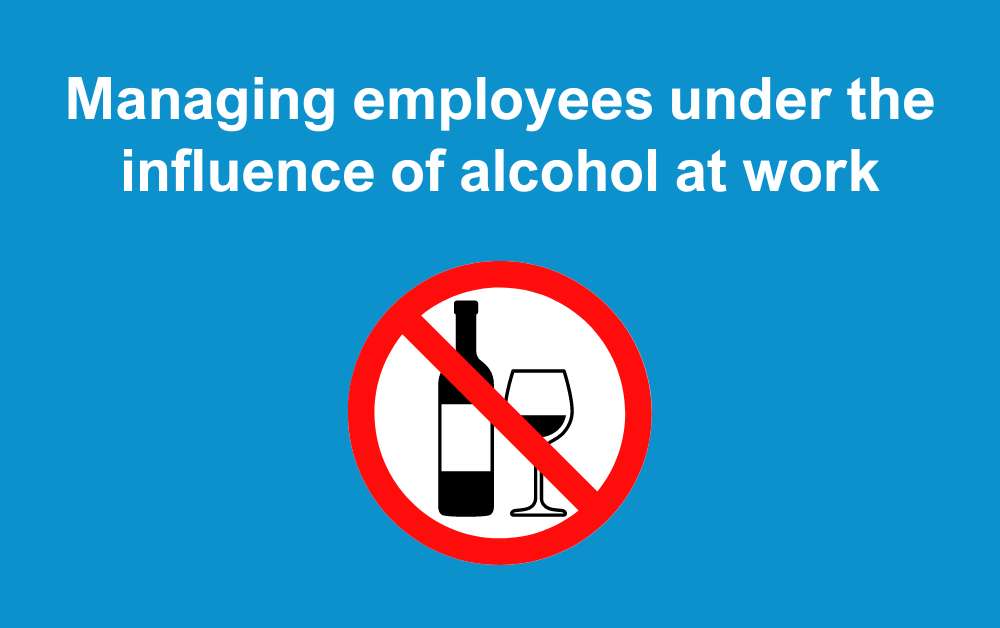If somebody is under the influence of alcohol in the workplace, you have a duty to look after your staff.
Some of your employees may enjoy a drink or two in their spare time outside of work. However, what do you do if they cross the line and it begins to affect the workplace?
Research suggests that around 17-million working days are lost every year due to alcohol-related problems. This figure doesn’t take into account reduced performance or accidents which may have been caused or influenced by alcohol.
A problem largely invisible on the first appearance, employees under the influence of alcohol in the workplace present a very significant risk. It’s an issue which must be taken seriously but can be one which is difficult to broach.
This guide will help you understand your position as an employer and what you can do about the problem.
Your legal responsibility
Although an individual has the responsibility of turning up to work fit for duty, as an employer you also have the responsibility of protecting your staff.
Under the Health and Safety at Work etc. Act 1974, there is the general requirement for employers to protect the health, safety and welfare of their staff, as far as is reasonably possible.
If you are aware an individual is under the influence of alcohol and you allow them to remain in the workplace, you could face prosecution if this places others at risk.
In certain industries there is an additional legal burden strictly prohibiting workers to be under the influence of either drink or drugs whilst at work. This includes the transport or railway system and is covered under the Transport and Works Act 1992.
Factors to consider
If an individual has a problem with alcohol in the workplace, it’s worth considering all the factors before deciding what approach to take.
For example, where does the problem originate from? Is the individual drinking during working hours or arriving under the influence already?
Remedying the problem will require a good understanding of the core cause. Just putting a sticking plaster over the symptoms won’t help anyone.
If an individual is getting drunk during working hours, is there a reason why this happens? Is socialising part of their role and they struggle to limit their alcohol intake? Is alcohol readily available on the premises? Do you allow employees to drink alcohol providing they limit their intake?
If the problem is occurring outside work, it may be more complex. Understanding an employee’s personal life can be key; are they going through any major life events such as a divorce or bereavement? It doesn’t make the behaviour acceptable but may explain the root of the problem.
Before tackling the member of staff, it is a good idea to review all the information you have available.
Check what their absence record is like and whether this has changed recently. If you have management information available, take a look at their performance. How do they measure up compared to their peers? Are there any obvious patterns?
An employee who drinks excessively at lunchtime may perform well in the morning but poorly in the afternoon. This may make their average output acceptable but when scrutinised more closely, a clear pattern of reduced performance can be seen.
An individual may have recently been promoted or changed to unsociable hours recently. If this is the case you need to consider whether this has had a negative impact on their wellbeing.
Steps to take
Any employee whose performance is being affected by alcohol in the workplace needs to be given support.
Once you have all the information available, you need to arrange a meeting with the individual. This subject must always be tackled confidentially and away from other members of staff.
Alcohol difficulties can be frustrating especially if they are having a significant impact on your business. However, you have a duty as an employer to treat alcohol problems in the same way as a medical condition. Not as a misdemeanour.
Any employee whose performance has been affected due to alcohol must be given the same type of support as any other psychological or physiological condition. Immediately pursuing the disciplinary route would be viewed very dimly by courts. This is unless all help and support avenues had firstly been exhausted.
The vast majority of individuals whose work has been affected by alcohol are able to successfully deal with the problem. In addition, the cost of recruiting, training and supporting a new member of staff would probably work out more expensive that providing help to overcome any alcohol related problems the individual is struggling with.
GP Support
Urging your employee to contact their GP for help in the first instance is important. This reassures them that you will help support them as they deal with the issue.
Occupational Health
Occupational health professionals can identify early signs of alcohol-related issues and offer confidential support systems, such as counselling or Employee Assistance Programs (EAPs).
By fostering a culture of open communication and non-judgment, occupational health creates an environment where employees feel comfortable discussing their struggles with alcohol and seeking guidance. Moreover, they collaborate with management to establish clear policies and protocols for dealing with alcohol-related incidents, ensuring consistency and fairness. Ultimately, the integration of occupational health strategies not only helps individuals overcome alcohol abuse but also contributes to a more productive, healthier, and safer workplace overall.
Regular Meetings
You should agree on future actions and arrange regular meetings to discuss progress.
Substance Misuse Policy
It’s also important that you have a clear substance misuse policy in place; this will help you should you need to ultimately take disciplinary action. This policy should outline explicitly what employees may and may not consume during working hours, and what steps will be taken if an employee is either found to be under the influence in the workplace or whose performance is being affected as a result.
Conclusion
Alcohol is an extremely difficult subject to broach and the key is not to be accusing or judgemental. Many individuals may find it hard to admit they have a problem.
As an employer, you have a duty to protect both the person that is under the influence and those around them, and trying to help them recover should be the primary focus. If however, this is unsuccessful, and the individual is unwilling to work with you, you will have no choice but to use your substance misuse policy and follow a disciplinary process. This should however always be considered as the last resort.
Contact Us
Contact us at The HR Booth for more information on alcohol in the workplace. We are here to help you and your employee.







